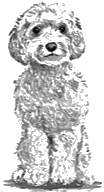Puppy Learning
At Double J Cockapoos, we believe the foundation for a puppy’s healthy development starts early. Our goal is to love and spoil babies but also, to give them the fundamental building blocks so they can grow into happy, healthy family members.
Outlined below are a few of the things we do to help establish this foundation for growth and development.
ENS/ESI Training
Early Neurological Stimulation or ENS was developed by the US Military to improve the abilities of their future service dogs. It is performed between days 3-16 of life and has shown to have a number of positive effects such as; improved cardiovascular performance (heart rate), stronger heart beats, stronger adrenal glands, more tolerance to stress, and greater resistance to disease. The areas of focus are tactile stimulation, head down, head erect, supine, and thermal stimulation. These 5 exercises are done each day, causing “stressors” and a release of glucocorticoids (stress hormones) from the adrenal system. Activating this part of the body, at this age, can lead to greater tolerances as an adult.
Early Scent Introduction or ESI, also conducted between days 3-16 of life, is designed to enhance a dog’s ability to identify and react to scents. Each day a new scent is introduced, and reaction recorded, whether positive, negative, or neutral. The purpose of this training is to create a greater scent awareness, with research showing dogs are better suited for companion, service, or therapy dogs when exposed to ESI.
Noise Training
While we believe ENS & ESI are crucial building blocks in a puppy’s development, our efforts do not stop there. On days 18-20, we introduce a brief loud noise; then in the days to follow we introduce other noises such as music, the vacuum cleaner, TV, etc to help with desensitization. At this age, puppies do not fear noise, so we start working to make them comfortable with all types of noise.
Play Therapy
Next, we move to play therapy. What puppy doesn’t like to play, right! The benefit to play therapy, they are learning and continuing their desensitization while doing something they enjoy. We offer lots of different toys that work through stimulation to help puppies develop… Tunnels for being comfortable with small spaces; toys that hang so they are not fearful of things hanging or moving around their head; balls that move and/or make noise for learning curiosity is natural and safe; slides to improve surefootedness.
While we use many types of play therapy techniques, two things we stay away from are hurdles and mazes. Puppies are growing fast at this age, and we do not want to create an environment that could cause injury or put unwanted stress on growing joints and legs. Larger breed dogs may respond better to this type of play, but cockapoos are small, and we want to protect their growing bodies.
Environmental Stimulus
Another path of training for us is environmental. We expose puppies to as many types of stimuli as is possible while maintaining their safety. While we would never allow other dogs around our puppies, dogs in our home are safe for socialization and allowed to interact with them. Different types of flooring and outside terrain are offered to help develop awareness and comfort. Around 7 weeks, puppies are introduced to stairs and helped in being comfortable going up and down.
Kennel & Potty Training
Lastly, but still very important, is kennel and potty training. We expose puppies to training pads while inside and start taking them outside at 6 weeks, after first set of shots, to use the bathroom. Most people say potty training is their least favorite part of puppy ownership, so we want to help foster a positive learning process.
Kennel training is also started at 6 weeks of age. We expose puppies to kennels and give them time by themselves, away from momma and littermates, to help develop comfort with being on their own. This helps with transitioning when puppies go to their new homes. Using kennels also helps foster a feeling of having their own space and feeling a sense of security when they are left alone.
The first year of a puppy’s life is so important in development and training, and while we only have them for the first few weeks of that, we want to foster the best foundation possible for healthy growth and development. We love what we do and take pride in the efforts we make in raising well-balanced puppies.
